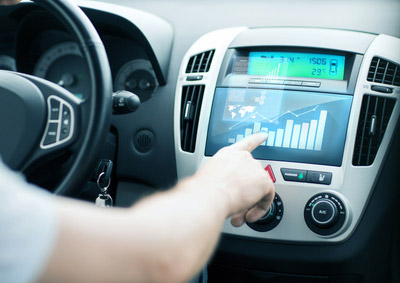An evolving sector driven by a new lifestyle and a push for safety improvements
The automotive market is an incredibly innovative sector due to its strong relationship with trends in technology.
Car manufacturers increasingly integrate devices and systems into their new vehicles, which has now culminated in the “connected auto”. The use of new in-car technologies can, of course, be seen as either practical and useful (and therefore contributing to the evolution of the product), or as mere add-on gadgets. Automobile manufacturers, like Fiat CA with their online courses for their employees, use the internet for better human resources purposes
The aim of this section is to describe the newest trends in connected car models and creative marketing strategies to fit it an era of technological revolutions.
Technical innovations in the automotive business offer a good overview of what the industry could look like in the future (with new types of vehicle such as flying cars). However, studies, analyses and statistics regarding the modernization of automobiles do not always generate errorless predictions.
Cars and Telecommunications

According to Allied Market Research, the global market for connected cars is expected to reach $141 billion by 2020. It should come as no surprise that North America and Europe will be a major marketplace for this new business and Asia-Pacific should follow with the fastest growth. Large coalitions of telecom and auto companies are predicted, as evidenced by the recent partnership between Audi and AT&T which aims to bring 4G/LTE connectivity to the German company’s vehicles. Hopefully, it could help reduce the amount of users of smartphones while driving (which is estimated to be close to 70% in the US)
By 2020, embedded and integrated digital solutions are predicted to be amongst the most popular connectivity options, representing 80% of the overall market. Navigation systems and “infotainment” features, which accounted for 80 % of market share in 2013, will continue to grow steadily in the future sector.
Self-Driving Cars
It is the dream of every sci-fi fan, as well as ordinary motorists who are tired of driving long distances to commute to work: a driverless vehicle. With new prototypes being unveiled every year, the groundbreaking innovation of an autonomous automobile with neither steering wheel nor pedals seems more and more attainable. Google (even though their accident reports on self-driven cars were not unveiled), Audi, Ford, Tesla (who recently announced they will soon bring the feature to their S model) and Daimler (with a new innovative autonomous semi-truck in a testing phase) are among the organizations pursuing innovative and reliable solutions such as this in the coming decades.
According to Vox, although critical obstacles are still to be overcome, self-driving automobiles would have true benefits. Fully autonomous cars should increase road safety by removing the human error factor and improve commuting conditions by decreasing stress in users and shortening traveling time. In addition, self-driving vehicles could facilitate the transition to electric vehicles, enhance the popularity of car-sharing programs and, therefore, lead to the popularization of green energy.
You might be interested in:
- Green energy efficient vehicles: an overview of the latest eco-friendly trends
 Written By
Written By